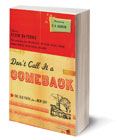 |
Don’t Call It a Comeback: The Old Faith for a New Day Kevin DeYoung (Crossway, 2011) |
Don’t Call It a Comeback: The Old Faith for a New Day (Crossway, 2011) is a primer on Reformed theology. But you wouldn’t know that by reading the cover copy or the introduction. Editor Kevin DeYoung presents the book as an introduction to evangelical theology. The major sections of the book are titled “Evangelical History,” “Evangelical Theology,” and “Evangelical Practice.” It would be more accurate, though, to say that the book articulates Reformed evangelical history, theology, and practice. The Reformed orientation isn’t made explicit. And it isn’t a problem, necessarily. It’s just a little misleading.
That quibble aside, the book is fantastic. Comprised of essays by twenty- and thirty-something pastors and writers, Don’t Call It a Comeback aims to “introduce young Christians, new Christians, and under-disciplined Christians to the most important articles of our faith and what it looks like to live out this faith in real life,” and “to reassert the theological nature of evangelicalism.” Lofty goals, but the book reaches them. The essays address major theological themes (such as the nature of God, Scripture, the gospel, and salvation), as well as evangelical positions on difficult contemporary issues, including vocation, social justice, homosexuality, and abortion. The final three chapters turn to the topic of the local church.
With a total of 18 chapters, the book covers nearly all the major topics of systematic theology. Conspicuously absent are chapters on the Holy Spirit, end times, and sacraments or ordinances. Even so, what I find remarkable is that each contributor takes his topic head on—no watered-down discussions here—but does so without sacrificing clarity or relevance. Every contributor makes a point of spelling out what difference these big ideas make, what’s at stake in accepting or rejecting them.
I can’t think of a more important accomplishment for a book that targets young, new, and uninitiated Christians. The writing is clear, conversational, and engaging. It never drags. The prose is tight and energetic. And, happily, the book is free of the smugness that many associate with the younger Reformed writers, perhaps because the tone of the prose is conversational, not polemical. In the chapter on homosexuality, for example, the authors are careful to acknowledge that, while they take a hard line against homosexual practice on biblical grounds, they understand the human and relational issues.
Of all the essays, Collin Hansen’s short history of evangelicalism does the best job of identifying the breadth of evangelical theological perspectives. Arguably American evangelicalism has Reformed roots, with Jonathan Edwards as its chief theologian and George Whitefield its first celebrity. But in the 19th century, as Hansen demonstrates, evangelicalism was profoundly influenced by a deep infusion of Wesleyan theology. Pentecostalism became, numerically speaking, the most significant influence on evangelicals’ theology in the 20th century. This is where the book’s shortcomings show most clearly. The project would have more accurately fulfilled its promise of articulating evangelical theology if there had been even a single Wesleyan or Pentecostal or woman among the contributors.
Second, I get the impression the contributors assume that right belief translates automatically into right behavior. For example, the essay on homosexuality is part of the “evangelical practice” section. But the chapter is about what the Bible teaches about homosexuality. It’s more about right belief than right action. I would have liked to see more on how we minister to and engage our GLBT friends and family members. In this and other “practice” chapters, the book is short on application.
These shortcomings aren’t fatal. On the whole, the book is an extraordinary resource. Reformed folk who want a simple summary of their theological position will find this a helpful refresher. It would make a great study for a high school or college small group for churches of any theological bent. It will be easy to see where you disagree. The prose is unambiguous. And because of space restrictions (and the young Reformed tendency to project certitude) the arguments are fairly black and white. At between 10 and 12 pages each, the chapters are a perfect length for weekly reading and discussion. There are many introductions to Christianity out there, but none I know of that cover quite so much ground so capably and clearly. For the young, new, or undisciplined Christian to whom the book is targeted, it will do just what it aims to do: set out the historic doctrinal commitments of the Christian faith in a clear, engaging 21st-century idiom.
—Brandon O’Brien is associate editor of Leadership Journal and author of The Strategically Small Church (Bethany, 2010).
Copyright © 2011 by the author or Christianity Today/Leadership Journal.Click here for reprint information on Leadership Journal.









